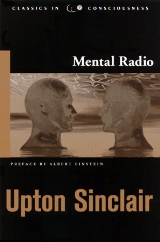
Mental Radio
Encyclopedia
Mental Radio: Does it work, and how? (1930) was written by the American
author Upton Sinclair
. This book documents Sinclair's test of psychic abilities of Mary Craig Kimbrough, his second wife, while she was in a state of profound depression with a heightened interest in the occult. She attempted to duplicate 290 pictures which were drawn by her husband. Sinclair claimed Mary successfully duplicated 65 of them, with 155 "partial successes" and 70 failures. These experiments were not conducted in a controlled scientific laboratory environment.
The preface was written by Albert Einstein
who praised Sinclair's observation and writing abilities as well as good faith and reliability. Einstein writes "The results of the telepathic experiments carefully and plainly set forth in this book stand surely beyond that which a nature investigator holds to be thinkable. On the other hand, it is out of the question in the case of so conscientious an observer and writer as Upton Sinclair that he is carrying on a conscious deception of the reading world; his good faith and dependability are not to be doubted." William McDougall
was influenced by the book to establish the parapsychology
department at Duke University
.
Walter Prince
of the American Society for Psychical Research
in Boston
conducted an independent analysis of the results in 1932. Based on his analysis it was his opinion that chance, educated guessing, or conscious or subconscious fraud were not sufficient in explaining the data. He asserted that telepathy had been demonstrated in Sinclair's data.
United States
The United States of America is a federal constitutional republic comprising fifty states and a federal district...
author Upton Sinclair
Upton Sinclair
Upton Beall Sinclair Jr. , was an American author who wrote close to one hundred books in many genres. He achieved popularity in the first half of the twentieth century, acquiring particular fame for his classic muckraking novel, The Jungle . It exposed conditions in the U.S...
. This book documents Sinclair's test of psychic abilities of Mary Craig Kimbrough, his second wife, while she was in a state of profound depression with a heightened interest in the occult. She attempted to duplicate 290 pictures which were drawn by her husband. Sinclair claimed Mary successfully duplicated 65 of them, with 155 "partial successes" and 70 failures. These experiments were not conducted in a controlled scientific laboratory environment.
The preface was written by Albert Einstein
Albert Einstein
Albert Einstein was a German-born theoretical physicist who developed the theory of general relativity, effecting a revolution in physics. For this achievement, Einstein is often regarded as the father of modern physics and one of the most prolific intellects in human history...
who praised Sinclair's observation and writing abilities as well as good faith and reliability. Einstein writes "The results of the telepathic experiments carefully and plainly set forth in this book stand surely beyond that which a nature investigator holds to be thinkable. On the other hand, it is out of the question in the case of so conscientious an observer and writer as Upton Sinclair that he is carrying on a conscious deception of the reading world; his good faith and dependability are not to be doubted." William McDougall
William McDougall (psychologist)
William McDougall FRS was an early twentieth century psychologist who spent the first part of his career in the United Kingdom and the latter part in the United States...
was influenced by the book to establish the parapsychology
Parapsychology
The term parapsychology was coined in or around 1889 by philosopher Max Dessoir, and originates from para meaning "alongside", and psychology. The term was adopted by J.B. Rhine in the 1930s as a replacement for the term psychical research...
department at Duke University
Duke University
Duke University is a private research university located in Durham, North Carolina, United States. Founded by Methodists and Quakers in the present day town of Trinity in 1838, the school moved to Durham in 1892. In 1924, tobacco industrialist James B...
.
Walter Prince
Walter Franklin Prince
Walter Franklin Prince was Investigating Officer of the Boston Society for Psychical Research in Boston during the years Harry Houdini served as an agent of the organization while investigating reportedly corrupt spiritualist mediums. Prince was an Episcopal minister, earning his two B.D.'s from...
of the American Society for Psychical Research
Society for Psychical Research
The Society for Psychical Research is a non-profit organisation in the United Kingdom. Its stated purpose is to understand "events and abilities commonly described as psychic or paranormal by promoting and supporting important research in this area" and to "examine allegedly paranormal phenomena...
in Boston
Boston
Boston is the capital of and largest city in Massachusetts, and is one of the oldest cities in the United States. The largest city in New England, Boston is regarded as the unofficial "Capital of New England" for its economic and cultural impact on the entire New England region. The city proper had...
conducted an independent analysis of the results in 1932. Based on his analysis it was his opinion that chance, educated guessing, or conscious or subconscious fraud were not sufficient in explaining the data. He asserted that telepathy had been demonstrated in Sinclair's data.
Further reading
- Dean I. Radin, The Conscious Universe: The Scientific Truth of Psychic Phenomena (NY: HarperOne, 2009), ISBN 0061778990

